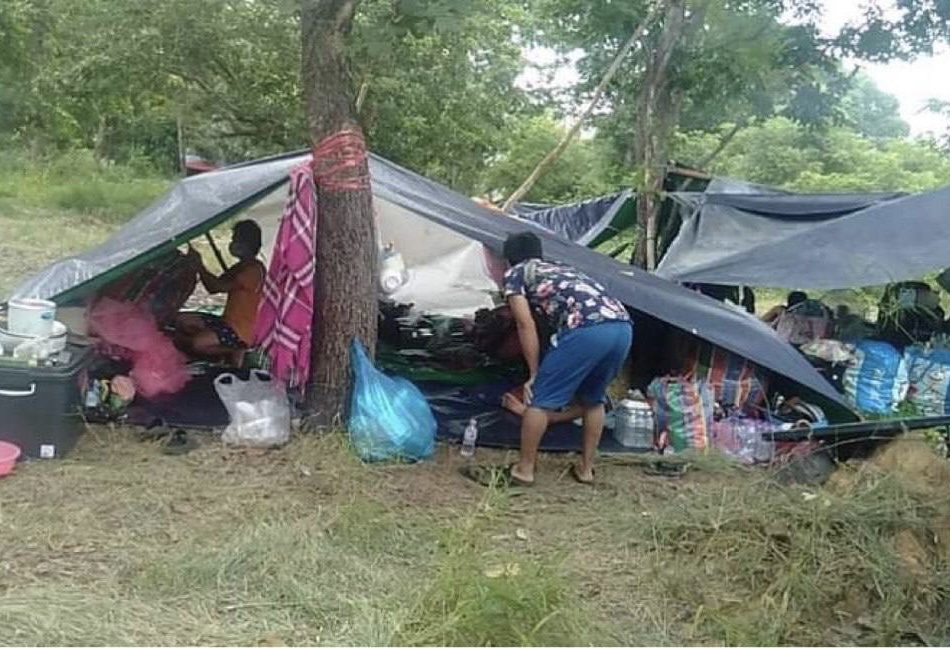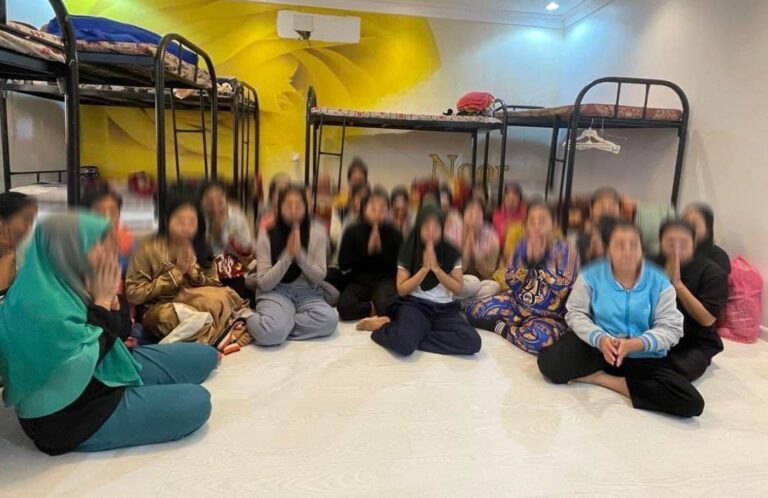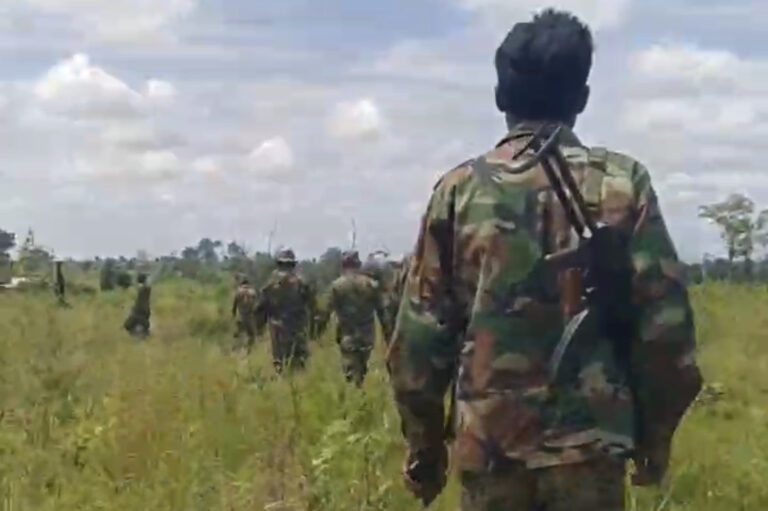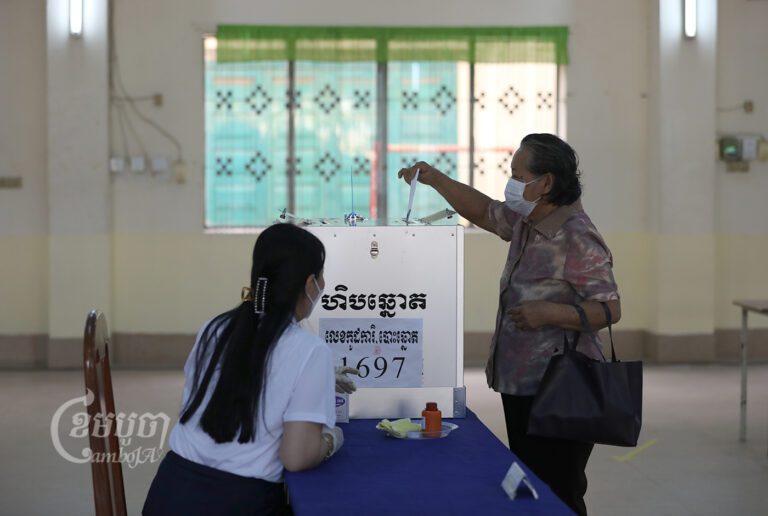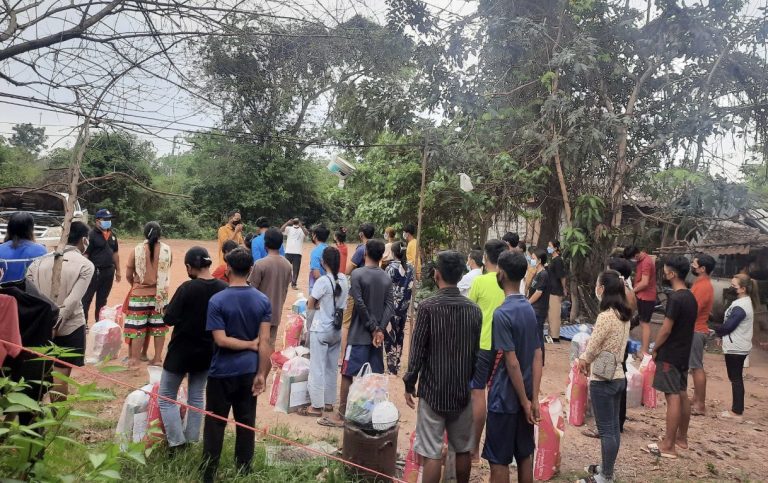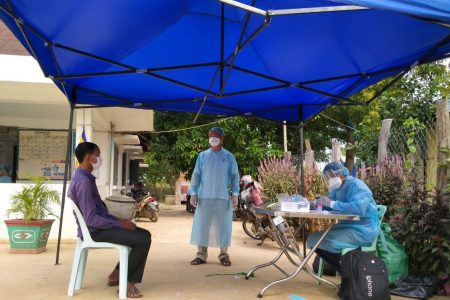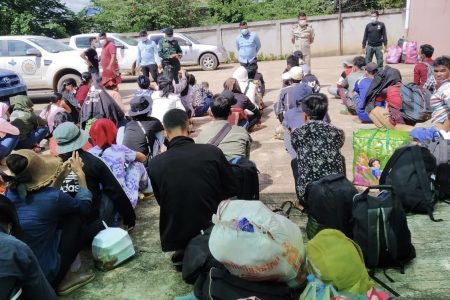As Cambodian migrant workers continue to return to the closed border amid the worsening COVID surge in Thailand, forest tent camps are proliferating, raising concerns for the health and safety of the workers — some of whom are traveling with infants.
Near the Boeng Trakuon checkpoint in Banteay Meanchey province, a group of 23 Cambodians, including two babies, have been camped out since Wednesday following an arduous, expensive journey from Thailand’s Songkla province.
“I am very tired because I walked a long way and I held my three-months-old baby and my husband carried our clothes and packages. I think that we walked and ran to escape from Thai authorities like in the war regime,” said Ren Sreyna, 29.
Sreyna said the group, most of whom worked at the same fishball factory in Thailand, left Monday, fearing the spread of COVID. Some had expired visas which they had been unable to extend because of the pandemic. A Cambodian man approached the group offering to arrange a van to the border, about a 20 hour trip, at a cost of 7000 baht ($210) a person. Along the way, he repeatedly demanded more cash, first an additional 2000 baht from the group, then another 500 baht each upon arriving in Bangkok. When a new driver took over, he charged another 350 baht a person.
Despite paying hundreds of dollars each, the group wasn’t brought to the border, said Sreyna.
“The truck driver and ringleader dropped us off near a mountain and we walked from 7 pm to 11 pm to arrive at the Thai-Cambodian border,” Sreyna said. “We walked and ran across the forest, cassava plantation and rice field because we were scared the Thai authorities would arrest us.”
On Thursday, Cambodian border authorities met the group and brought them tents, mosquito nets, blankets, mats and pillows.
“I cannot sleep well because we sleep on the mat on the ground and I just gave birth and my body is not strong yet,” Sreyna said.
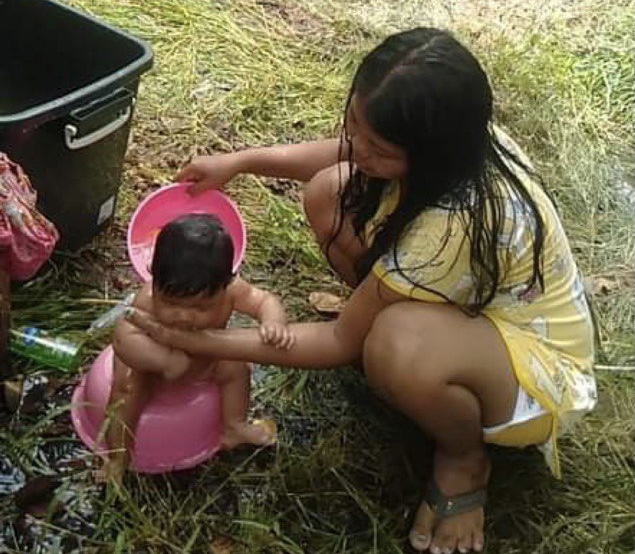
Officials asked the group why they returned when the border was closed, said Sreyna, who explained that none had heard the news. They are hardly alone. Hundreds of migrant workers have returned to the border in recent days, though it was closed July 29 for two weeks to prevent the spread of the highly contagious Delta variant of COVID-19.
“Now, the Cambodian authorities provided meals three times a day and they said that they will allow migrant workers into Cambodia when the border reopens,” Sreyna said. “ I request the authorities provide enough food for us, especially women who have babies because we need to breastfeed.”
Sreyna’s husband, Buth Sary, said the group also wished to request a toilet — given the dangers of moving through the forest at night.
“We are afraid that animals or snakes will attack or land mines too,” said Sary.
Pech Vanna, chief of RCAF Cambodia-Thailand Relation Border, said on Thursday that Cambodian authorities ordered migrant workers to remain in place for two weeks and that authorities are providing them with food.
“We asked them to quarantine for 14 days and we are supplying them meals three times a day,” Vanna said, declining to answer further questions.
In a video recording released on Friday evening, Prime Minister Hun Sen ordered provincial governors to move those staying on the border to quarantine centers.
“Please governors of provinces and cities, organize additional quarantine centers to receive the people who are returning from the Cambodian-Thai border,” Hun Sen said.
Hun Sen said that RCAF officials should send 200 vehicles to move migrant workers who have already been quarantined for seven days in border provinces to quarantine centers in their home provinces, in order to free up space at the border.
“In case [too many migrant workers] return to Cambodia and overload [border centers], [we] must implement a measure… to test them immediately and transport them to the provinces or cities to quarantine [at their provinces],” Hun Sen said. He said more than 10,000 people are quarantining across the border and will be permitted to be moved into quarantine centers inside Cambodia.
The premier also ordered Or Vandine, director of the Vaccination Committee, to send AstraZeneca vaccines to provide third dose shots to approximately 30,000 doctors, armed forces, and civil servants working at the border.
“So please, Her Excellency Or Vandine deploy the AstraZeneca vaccine to that area immediately,” Hun Sen said.
Koy Kuong, Foreign Affairs Ministry spokesman said via Telegram on Thursday that Cambodian representatives in Thailand have been distributing kits to migrant workers who live in Thailand and those staying along the border.
He said on August 3 and 5, a working group from the Consulate General of Cambodia in Sa Kaeo Province, across the border from Banteay Meanchey, delivered food and equipment, including rice, canned fish, fish sauce, soy sauce, noodles, fever medicine, painkiller, cough syrup, infant formula, bandages, cellulite, alcohol, tents and more to Cambodian workers camped along the Cambodian-Thai border.
Um Reatrey, Banteay Meanchey provincial governor declined to comment but Em Sokha, Thma Puok district governor in Banteay Meanchey province, said on Thursday that district officials cooperated with nation level authorities to provide meals three times a day for hundreds of returning migrants and distributed mosquito nets, blankets and tents. He also said that they were organizing to provide the group with portable toilets, as requested.
“We quarantine them for 14 days until the border reopen,” Sokha said, adding that they also are testing the workers and any who test positive are brought to treatment centers.
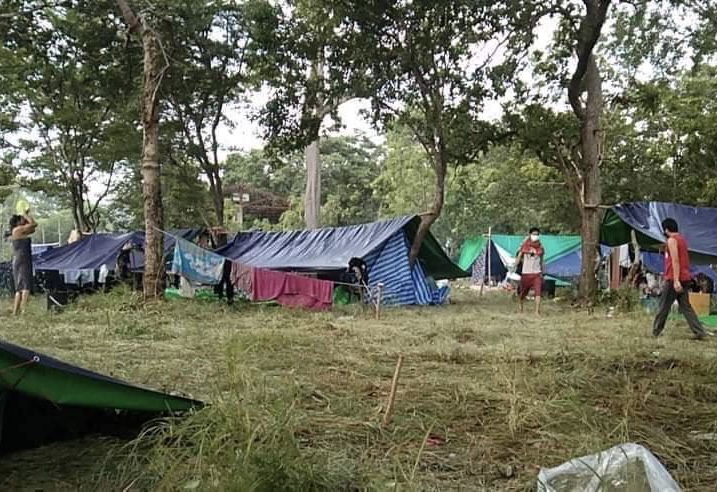
Phun Chhin, coordinator of rights group Licadho in Banteay Meanchey province, said the high rates of COVID-19 in Thailand had frightened many Cambodians into returning home, but many did not know the border had been shut.
“I think that Cambodian authorities should… bring them to some place inside Cambodia — it is better than letting them stay along the border of Thailand-Cambodia where they lack food, shelter, and medicine,” he said.
Loeng Sophon, a Thailand-based project officer for Cambodian labor rights group Central on Thursday, said Cambodian migrant workers are returning in part because if they fall ill they are unlikely to receive treatment in Thailand.
“The reason that they want to return to Cambodia is because if they tested positive for COVID-19, they do not have enough beds for treatment” said Sophon.
Sophon added that among a group of about 300 Cambodians who worked in one factory in Thailand’s Chon Buri province, nearly all tested positive for COVID-19 but were unable to get treated.
“As a final choice, they used traditional medicine and they got better but a few days later, they still had the same symptoms,” he said.
On Friday, the Ministry of Health reported 588 new cases of COVID-19 including 165 imported cases, bringing the total count to 80,813 including 11,700 imported cases since the pandemic began in early 2020. The large majority of these cases have been recorded since February 20, when the ongoing community outbreak began in Cambodia. The ministry has also recorded 74,045 recovered cases and 1,526 deaths from the virus.


